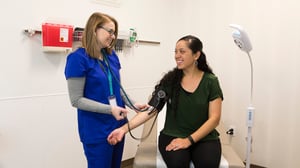Remember when you started going to the OB/GYN every year for a pelvic exam and pap smear? And then, when you got a little older, your doctor added a breast exam and annual mammogram? If you’ve been going regularly all your life — or have avoided going — it might surprise you to know that women’s health visits have changed.
Why annual visits have changed
Let’s start with the phrase “annual exam.” It’s true that for years we did some exams like clockwork. Once you hit a certain age or became sexually active, you could expect the same tests every year. But years of research have shown that most of this general testing is unnecessary.
Rather than doing the same things every year out of convention, the new best practice standards set by medical boards like the AAFP and ACOG are based on proven outcomes. As it turns out, every woman is different! A one-size-fits-all approach to women’s health is out.
What that means is you and your body are our best resource for determining your health risks. The personal approach has far better outcomes.
What to expect at the new annual visit
When we talk about an “annual visit” now, we mean a general health screening. We look at your health history, your family health history, and any changes to your health over the last year. As a practice, we don’t do pelvic exams, pap smears, breast exams and mammograms on a set schedule for every woman like we used to. Instead, any next steps are based on you.
At Vera, we determine this together. If you are 30 and your mother was diagnosed at age 28 with breast cancer, for example, our recommendations for you will be very different from a woman in her 40s with no history of cancer.
The best way to keep on top of your health is to know your family health history (as much as possible) and communicate with your provider about your own health and any issues or concerns you have.
When gynecological exams are recommended
Even though your annual doctor’s visit is different from what it may have been in the past, if you’re like most women, you probably still want to know when or if the standard tests of the past may be called for.
Please remember that these are general guidelines and that talking openly with your provider is the best way to determine what’s right for you.
- Pap smear
In general, pap smears are performed to look for the HPV virus and are not recommended until a female is 21 years of age and sexually active. If the initial Pap smear is negative for presence of the HPV virus, the next one is not recommended for 3 years. - STD screening
Any woman should be screened for sexually transmitted diseases as soon as she becomes sexually active and any time she has a new partner. Chlamydia, one of the most common STD’s, usually causes no symptoms but is the leading cause of infertility in women. - Pelvic exam
A lot of women mistake having a pelvic exam with a Pap smear and they are not the same thing. A pelvic exam is primarily to determine the size of a cyst and in pregnancy to determine the size of the uterus. There is no need for a general pelvic exam as ultrasounds are a far more accurate way to see what’s going on inside you. - Breast exam
It may surprise you to know that by the time a cancer lump, can be felt in the breast, it has probably been there at least 7 years. Putting emphasis on clinical breast exams has been found to develop a false sense of security. Often, women think if the exam, done by them or their provider is normal then they do not need a mammogram. - Mammogram
There is no longer a specific age to start mammograms. Mammograms are usually recommended for women with a history of genetic breast cancer no matter what her age. The frequency of the scan is based on results and any changes that are concerning to you or your provider. And, depending on your breast architecture, your provider may recommend ultrasound as well.
What to expect after menopause
Everything changes after menopause – women’s health becomes a whole new ball game (which we’ll cover another time). But while the conversations about specific concerns may change, the basis for any recommended testing and treatment is still YOU.
Schedule your annual Vera Whole Health visit
If you haven’t been to the doctor this year or if you’ve experienced some changes to your health, please schedule a Whole Health visit today. It may not be as predictable as the old Annual Exam, but it’s far more valuable to your personal wellness. And that’s a good thing.
Sign up
Join our email list to receive the latest open positions, Vera Careers news, and more.




